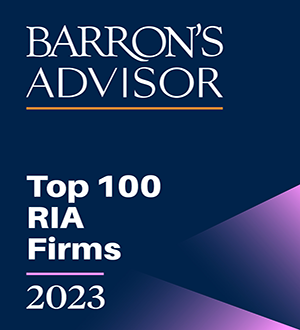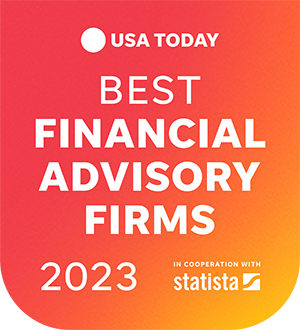April-May Market View
By Argent Wealth Management, LLC on April 18, 2024
Conclusions
- The stock market might be at the start of a correction within an ongoing bull market.
- If not, a correction is likely at some point between now and the fall.
- Investors will likely get more pessimistic before the correction ends and the bull market resumes.
- Look for repositioning opportunities during a correction.
Large Cap Stocks
- The S&P 500 was up over 45% since October 13, 2022 (the low in the last bear market), at its recent peak on April 1.
- However, the S&P 500 recently dipped below it’s 200 day moving average and is down about 4% off its high.
- The S&P 500 remains at the higher end of its valuation range and the lower end of its dividend yield over the last two years.

Small Cap Stocks
- The Russell 2000 was up around 30% since October 13, 2022, at its recent peak on April 1.
- The Russell 2000 is down around 7% and has dipped below its 200 and 100-day moving average.
- The Russell 2000 is at the lower end of its valuation range and the higher end of its dividend yield over the last two years.
- While the S&P 500 has made new highs in April, the Russell 2000 remained about 18 percentage points away from its all-time high.
- If the bull market continues, it is likely small cap indices will exceed previous highs. This, combined with a lower valuation, means they potentially have more upside than large cap stocks.

Source Date: FactSet 4/17/2024
Corrections
- Corrections within bull markets are common.
- It has been about 105 days since the last 5% or 10% correction.
- Historically, 5%-10% corrections occur, on average, every 51 days since 1928.
- A 10-20% correction happens every 172 days on average.

Presidential Cycle
- The first half of presidential election years tend to be choppier than the second half.
- On average they tend to be strong years.
- This would support the case for a correction within an ongoing bull market.

Recession Odds Low
- Despite the potential for a correction, a recession is unlikely.
- Major drawdowns, or bear markets, usually occur when the odds of a recession are high and increasing.
- For example, the S&P 500 was down about 25% between January and October 2022.
- A recession did not occur, but the odds increased dramatically over that time.
- This model is based on Composite Leading Indicators created by the OECD for 35 countries.

Economy Remains Strong
- Recession odds are not just low, the economy is strong!
- There are about 1.4x the number of job openings per unemployed.

Consumer Health
- The financial obligations ratio (which includes debt, vehicle leases, rent, insurance, and property taxes) is below the historical average.
- Consumption is about 70% of GDP in the U.S., and the consumer is in good shape.

Credit Conditions
- Despite higher interest rates, the availability of credit to consumers and businesses is favorable.
- Credit is available to expand your business or buy a home.
- This measure would likely be on a downward trajectory if a recession was imminent.
- The credit conditions index is comprised of spread, delinquency, debt service, debt capacity, and lending standards indices.

Inflation
- The strength of the economy, however, is the very reason inflation has remained stickier than expected.

The Federal Reserve
- Stickier than expected inflation has decreased how much investors expect the Fed to lower interest rates.
- Higher for longer than expected interest rates has caused investors to become more cautious.
- Rates to borrow remain elevated for both consumers and business longer than expected, increasing the hurdle rate to make major purchases, investments, or capital expenditures.
- On January 1, 2024, investors expected rates to be between 4 and 4.25% this September. The expectation is that rates are likely to be in the 5-5.25% range now.

Source Date: FactSet 4/17/2024
Stock Market Sentiment
- In January, when investors expected up to 5 rate cuts by September, NDR’s trading sentiment was in the extreme optimism zone around 87.
- Since then, it has made its way down to 50, indicating investors are somewhat neutral.
- A correction in the 5-10% range would likely cause trading sentiment to drop into its extreme pessimism zone, where the S&P 500 averages 24.99% a year since 2006.

Presidential Sentiment
- Unless the mood about the president is extremely pessimistic, which often coincides with external economic shocks (see extreme pessimism during 2008 financial crisis), it isn’t bad for the stock market.
- Note: Prior to 2009 there was more variation in the general public’s mood about the President. It has been in and around the pessimism zone for much of the last 15 years.

History of Bull Markets
- With odds of a recession low, a correction is more likely than a bear market.
- If the bull market does resume after a correction, what should investors expect?
- The mean for all bull markets is an 85.9% gain over 576 market days.
- The Dow Jones is up about 30% over the past 400 market days.
- Historically, cyclical bulls within secular bulls, which is what it looks like we are in today, returned about 105% on average over 751 days.

Sign up to receive more information about Argent's Services and Solutions.
Argent Wealth Management, LLC is a group comprised of investment professionals registered with Hightower Advisors, LLC, an SEC registered investment adviser. Some investment professionals may also be registered with Hightower Securities, LLC (member FINRA and SIPC). Advisory services are offered through Hightower Advisors, LLC. Securities are offered through Hightower Securities, LLC.
This is not an offer to buy or sell securities, nor should anything contained herein be construed as a recommendation or advice of any kind. Consult with an appropriately credentialed professional before making any financial, investment, tax or legal decision. No investment process is free of risk, and there is no guarantee that any investment process or investment opportunities will be profitable or suitable for all investors. Past performance is neither indicative nor a guarantee of future results. You cannot invest directly in an index.
These materials were created for informational purposes only; the opinions and positions stated are those of the author(s) and are not necessarily the official opinion or position of Hightower Advisors, LLC or its affiliates (“Hightower”). Any examples used are for illustrative purposes only and based on generic assumptions. All data or other information referenced is from sources believed to be reliable but not independently verified. Information provided is as of the date referenced and is subject to change without notice. Hightower assumes no liability for any action made or taken in reliance on or relating in any way to this information. Hightower makes no representations or warranties, express or implied, as to the accuracy or completeness of the information, for statements or errors or omissions, or results obtained from the use of this information. References to any person, organization, or the inclusion of external hyperlinks does not constitute endorsement (or guarantee of accuracy or safety) by Hightower of any such person, organization or linked website or the information, products or services contained therein.
Click here for definitions of and disclosures specific to commonly used terms.


